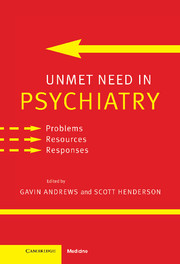Book contents
- Frontmatter
- Contents
- List of Contributors
- Preface
- Part I Unmet need: defining the problem
- Part II Unmet need: general problems and solutions
- Introduction
- 4 The epidemiology of mental disorder treatment need: community estimates of ‘medical necessity’
- 5 Some considerations in making resource allocation decisions for the treatment of psychiatric disorders
- 6 The need for psychiatric treatment in the general population
- 7 Comparing data on mental health service use between countries
- 8 The challenges of meeting the unmet need for treatment: economic perspectives
- 9 Unmet need for prevention
- 10 Meeting unmet needs: can evidence-based approaches help?
- 11 Unmet need for management of mental disorders in primary care
- 12 Is complementary medicine filling needs that could be met by orthodox medicine?
- Part III Unmet need: people with specific disorders
- Part IV Unmet need: specific issues
- Part V Unmet need: conclusion
- Index
5 - Some considerations in making resource allocation decisions for the treatment of psychiatric disorders
from Part II - Unmet need: general problems and solutions
Published online by Cambridge University Press: 21 August 2009
- Frontmatter
- Contents
- List of Contributors
- Preface
- Part I Unmet need: defining the problem
- Part II Unmet need: general problems and solutions
- Introduction
- 4 The epidemiology of mental disorder treatment need: community estimates of ‘medical necessity’
- 5 Some considerations in making resource allocation decisions for the treatment of psychiatric disorders
- 6 The need for psychiatric treatment in the general population
- 7 Comparing data on mental health service use between countries
- 8 The challenges of meeting the unmet need for treatment: economic perspectives
- 9 Unmet need for prevention
- 10 Meeting unmet needs: can evidence-based approaches help?
- 11 Unmet need for management of mental disorders in primary care
- 12 Is complementary medicine filling needs that could be met by orthodox medicine?
- Part III Unmet need: people with specific disorders
- Part IV Unmet need: specific issues
- Part V Unmet need: conclusion
- Index
Summary
Introduction
The key premise of the symposium on which this volume is based is that no society can afford to intervene to meet the needs of all the people found in psychiatric epidemiological surveys to have a clinically significant psychiatric disorder. Therefore, some triage rules are required to rationalize the allocation of limited resources. The assumption implied in the title of the symposium ‘The Unmet Need for Treatment’ is that differential need should be the main deciding factor from which these rules are developed. The challenge presented to speakers was to grapple with the complexities of operationalizing the concept of differential need for the purposes of developing such rules.
Health policy analysts have been concerned with the issue of resource allocation for quite some time (e.g., Bobadilla, Cowley, Musgrove & Saxenian, 1994; Patrick & Erickson, 1993; Wagstaff, 1991). The urgency of the issue as it concerns psychiatric disorders hit home in the mid1980s when the Epidemiologic Catchment Area (ECA) Study, the first general population survey of psychiatric disorders in the USA, documented that one out of every five people in the population meets criteria for a psychiatric disorder over a period of six months (Myers et al., 1984). President Clinton's proposal for national health reform further fuelled concerns about runaway health care costs. Cost containment for treating psychiatric disorders became a focal point of the ensuing health reform debate.
One response to these developments was to argue that many of the people reported to have a psychiatric disorder actually had relatively benign, selflimiting conditions of the sort that do not require treatment (Regier et al., 1998).
Keywords
- Type
- Chapter
- Information
- Unmet Need in PsychiatryProblems, Resources, Responses, pp. 59 - 84Publisher: Cambridge University PressPrint publication year: 2000
- 4
- Cited by



